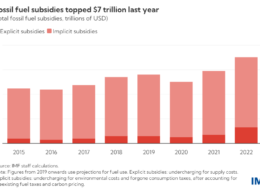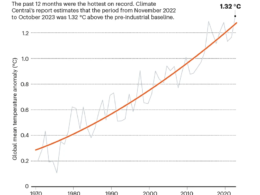the health strategist
institute for strategic health transformation
& digital technology
Joaquim Cardoso MSc.
Chief Research and Strategy Officer (CRSO),
Chief Editor and Senior Advisor
October 30, 2023
One page summary
What is the message?
Recognizing that climate change and biodiversity loss are an indivisible crisis is crucial for global health.
This interconnected challenge has severe impacts on human health and the natural world, affecting everything from clean water access to mental well-being.
Urgent, coordinated action is needed to address this global health emergency.

What are the key points?
The Indivisible Crisis:
Over 200 health journals call for the United Nations, political leaders, and health professionals to recognize that climate change and biodiversity loss are inseparable crises and should be addressed together to safeguard global health. The severity of the overall environmental crisis demands immediate action as a global health emergency.
Interconnected Challenges:
Climate change and biodiversity loss have traditionally been treated as separate issues. However, research communities, in a 2020 workshop, concluded that these challenges are interrelated and must be tackled holistically to prevent maladaptation and maximize positive outcomes.
Impacts on Health:
The indivisible planetary crisis directly impacts human health by disrupting social and economic systems, leading to shortages of land, shelter, food, and water, exacerbating poverty, and causing mass migration and conflict. Climate change intensifies health threats such as rising temperatures, extreme weather events, air pollution, and infectious diseases.
Ecosystem Health:
Damage to one subsystem of the natural world can have cascading effects on others, impacting soil, carbon storage, and the overall health of ecosystems. However, restoration efforts in one area can positively affect another, emphasizing the importance of integrated solutions.
Inequality and Environmental Challenges:
The impacts of climate change and biodiversity loss will disproportionately affect vulnerable communities, and addressing these crises can mitigate social and health inequities.
A Global Health Emergency:
The article calls for the World Health Organization (WHO) to declare the climate and nature crisis as a global health emergency based on its seriousness, unusual nature, implications for global public health, and the need for immediate international action. This declaration should be made before or at the 77th World Health Assembly in May 2024.
Statistics and Examples
- Industrialized countries agreed to mobilize $30 billion per year to support developing nations in conserving at least 30% of the world’s land, coastal areas, and oceans by 2030.
- The loss of biodiversity and climate change have severe impacts on health, including waterborne diseases due to water pollution, loss of genetic diversity in the food system, increased rates of non-communicable, autoimmune, and inflammatory diseases, and declines in mental health.
- Access to high-quality green spaces can improve community health by filtering air pollution, reducing temperatures, and promoting physical activity. However, these benefits are threatened by urbanization.
- The interplay of climate change and biodiversity loss can lead to abrupt breakdowns in the functioning of nature, which, if realized, would have catastrophic impacts on health globally.
Conclusion
The article underscores the need to integrate efforts to address climate change and biodiversity loss to protect human health, advocates for the WHO to declare the crisis a global health emergency, and calls on health professionals and political leaders to prioritize the health benefits of tackling this global emergency.
DEEP DIVE

This summary was written based on the article “Time to treat the climate and nature crisis as ine indivisable global health emergency based on the article”, published by BMJ Journals and written by Chris Zielinski.
To read the original publication, click here.












